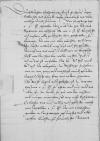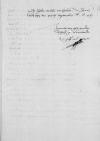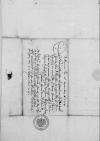Uns ist gestrigs tags E(wer) F(urstlichen) D(urchlauch)t cf. Albrecht I von Hohenzollern-Ansbach to Ioannes DANTISCUS Lyck, 1541-09-15, CIDTC IDL 4919⌊schreibencf. Albrecht I von Hohenzollern-Ansbach to Ioannes DANTISCUS Lyck, 1541-09-15, CIDTC IDL 4919⌋, / dat(um) Lyck (Ełk), town in Ducal Prussia, ca. 160 km SE of Königsberg, 75 km N of Łomża⌊LickLyck (Ełk), town in Ducal Prussia, ca. 160 km SE of Königsberg, 75 km N of Łomża⌋ den XV dits, / und dorÿnnen ein abschrift des, / wie E(wer) F(urstliche) D(urchlauch)t Sigismund I Jagiellon (Zygmunt I) (*1467 – †1548), King of Poland and Grand Duke of Lithuania (1506-1548); Duke of Głogów (Glogau) (1499-1506), Duke of Opava (1501-1506), Governor of Silesia (1504-1506); son of King Kazimierz IV Jagiellon and Elisabeth of Austria⌊koniglicher m(aieste)tSigismund I Jagiellon (Zygmunt I) (*1467 – †1548), King of Poland and Grand Duke of Lithuania (1506-1548); Duke of Głogów (Glogau) (1499-1506), Duke of Opava (1501-1506), Governor of Silesia (1504-1506); son of King Kazimierz IV Jagiellon and Elisabeth of Austria⌋, unserm allergnedigisten hern, geschrieben, / zukommen, / die wir mit vleis uberlesen, / und uns der sachen notturft nach fast wol hat gefallen, / dornach wir uns auch, / so bald wir an koniglichn hoff werden schreiben, / wollen richten, / und so vil an uns ist, / anhalten, / das bei Charles V of Habsburg (*1500 – †1558), ruler of the Burgundian territories (1506-1555), King of Spain as Charles I (1516-1556), King of Naples and Sicily, King of the Romans (1519-1530), Holy Roman Emperor of the German Nation (elected 1519, crowned 1530, abdicated 1556); son of Philip I the Handsome and Joanna the Mad of Castile⌊ro(mische)r key(serliche)rCharles V of Habsburg (*1500 – †1558), ruler of the Burgundian territories (1506-1555), King of Spain as Charles I (1516-1556), King of Naples and Sicily, King of the Romans (1519-1530), Holy Roman Emperor of the German Nation (elected 1519, crowned 1530, abdicated 1556); son of Philip I the Handsome and Joanna the Mad of Castile⌋ unnd Ferdinand I of Habsburg (*1503 – †1564), from 1521 Archduke of Austria, from 1526 King of Bohemia and Hungary, Croatia and Slavonia as Ferdinand I, 1531-1558 King of the Romans, 1558-1564 Holy Roman Emperor; son of Philip I the Handsome and Joanna the Mad of Castile, a younger brother of Charles V of Habsburg⌊ko(nigliche)r m(aieste)tFerdinand I of Habsburg (*1503 – †1564), from 1521 Archduke of Austria, from 1526 King of Bohemia and Hungary, Croatia and Slavonia as Ferdinand I, 1531-1558 King of the Romans, 1558-1564 Holy Roman Emperor; son of Philip I the Handsome and Joanna the Mad of Castile, a younger brother of Charles V of Habsburg⌋ die ubergebne im Imperial Diet (Reichstag) ⌊reichstageImperial Diet (Reichstag) ⌋ supplicacion / in iren gang und entschafft wurd gefurdert, / dieweil solchs von hoen und andern The Imperial Estates ⌊stendenn des reichsThe Imperial Estates ⌋ begert und gebethen ist. / Was wir hierinne E(wer) F(urstlichen) D(urchlauch)t zu ehren und nutz / und uns allen hie im Royal Prussia (Prussia Regalis), region, part of Prussia annexed to the Kingdom of Poland in 1466 under the provisions of the Second Peace of Thorn⌊landeRoyal Prussia (Prussia Regalis), region, part of Prussia annexed to the Kingdom of Poland in 1466 under the provisions of the Second Peace of Thorn⌋ zu gut werden wissenn und mugen ausrichten, / sal uns nicht beschweren. / Erbiethen uns auch willig und geflissen, / welchs wir derselbten E(wer) F(urstlichen) D(urchlauch)t, / die wir gotlichenn gnaden in langweriger gesuntheit und aller wolfart bevelhen, / zu freuntlicher antwort  GStA PK, HBA, C1 No 793, 2 unnumbered nicht haben wollen vorhalten. /
GStA PK, HBA, C1 No 793, 2 unnumbered nicht haben wollen vorhalten. /
 GStA PK, HBA, C1 No 793, 3 unnumbered
GStA PK, HBA, C1 No 793, 3 unnumbered  GStA PK, HBA, C1 No 793, 1 unnumbered
GStA PK, HBA, C1 No 793, 1 unnumbered
 GStA PK, HBA, C1 No 793, 2 unnumbered nicht haben wollen vorhalten. /
GStA PK, HBA, C1 No 793, 2 unnumbered nicht haben wollen vorhalten. /


